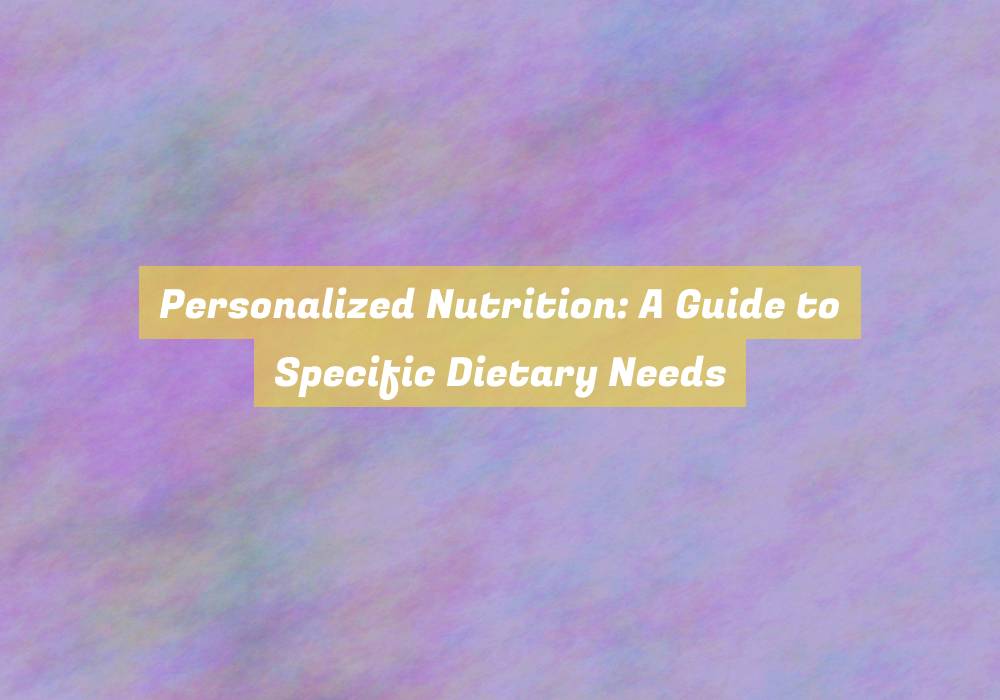Personalized Nutrition: A Guide to Specific Dietary Needs
When it comes to nourishing your body, think of personalized nutrition as a tailor-made suit, designed to fit you perfectly. Just as no two individuals are exactly alike, no two dietary needs are the same.
Understanding how to customize your nutrition to meet your specific health and wellness goals can be a game-changer. But where do you begin?
LetG??s explore the factors that influence your unique dietary needs and how personalized nutrition can be the key to unlocking your full potential.
Understanding Personalized Nutrition
Understanding personalized nutrition is crucial for tailoring dietary recommendations to individual needs and optimizing health outcomes. By delving into personalized nutrition, you gain insight into how genetic, metabolic, and lifestyle factors influence your bodyG??s response to different foods. This understanding allows you to fine-tune your dietary choices based on your specific requirements, ultimately leading to improved overall health.
When you comprehend personalized nutrition, you can identify which foods support your unique metabolism and which ones may lead to adverse effects. This knowledge empowers you to make informed decisions about your diet, ensuring that you provide your body with the nutrients it needs while minimizing the risk of potential health issues.
Moreover, understanding personalized nutrition enables you to appreciate the significance of individualized dietary recommendations. Rather than adhering to generic dietary guidelines, you can tailor your food choices to align with your specific genetic predispositions and metabolic tendencies. This personalized approach can lead to more effective outcomes, as it acknowledges the diversity in individual nutritional needs.
In essence, understanding personalized nutrition equips you with the knowledge to customize your dietary intake in a way that supports your unique biological makeup and promotes optimal health.
Factors Influencing Dietary Needs
Now that you grasp the impact of personalized nutrition on your dietary choices, letG??s explore the various factors that influence your specific dietary needs.
Your age plays a significant role in determining your dietary requirements. As you age, your metabolism slows down, and your body may require fewer calories. On the other hand, certain nutrients, such as calcium and vitamin D, become more crucial for maintaining bone health.
Your gender is also a key factor. For instance, women of childbearing age need more iron to replace whatG??s lost during menstruation, while men generally require more protein and calories due to higher muscle mass.
Additionally, your activity level affects your dietary needs. If you lead an active lifestyle or engage in regular exercise, your body will require more energy and specific nutrients to support muscle recovery and overall performance.
Health conditions, such as diabetes, food allergies, or heart disease, can also significantly impact your dietary needs, often requiring specific modifications to your diet.
Lastly, your genetic makeup and family history can influence how your body processes certain nutrients and your risk for developing certain conditions, making personalized nutrition even more essential for optimizing your health.
Tailored Dietary Plans for Health Goals
To achieve your health goals, itG??s crucial to develop a tailored dietary plan that aligns with your specific nutritional needs and lifestyle. Whether your aim is weight management, improved energy levels, or better overall health, a personalized approach to nutrition can significantly enhance your success.
Start by identifying your health objectives and then consult with a registered dietitian or nutritionist to create a customized plan that suits your individual requirements.
When tailoring your dietary plan, consider factors such as your age, gender, activity level, and any specific health conditions or allergies. Your nutritionist will help you establish realistic and achievable goals, taking into account your food preferences and cultural dietary habits. By creating a plan that accommodates your lifestyle and personal tastes, youG??ll be more likely to stick with it in the long term.
In addition to meeting your specific nutritional needs, a tailored dietary plan should also be flexible enough to adapt as your health goals evolve. Regular follow-ups with your nutritionist will allow for adjustments to be made based on your progress and any changes in your circumstances.
Implementing Personalized Nutrition
When implementing personalized nutrition, consult with a professional to create a dietary plan tailored to your specific needs and lifestyle. A registered dietitian or nutritionist can assess your health status, dietary habits, and personal preferences to develop a customized nutrition plan. This plan will consider your individual nutrient requirements, food intolerances, allergies, and cultural food practices. Additionally, it will be designed to support your health goals, whether they involve weight management, athletic performance, managing medical conditions, or improving overall well-being.
After consulting with a professional, the next step is to implement the personalized nutrition plan into your daily routine. This may involve making gradual dietary changes, incorporating new foods, or adjusting portion sizes to align with your specific nutritional needs. ItG??s important to remain flexible and open-minded, as personalized nutrition is a dynamic process that may require ongoing adjustments based on your progress and changing health circumstances.
Remember that personalized nutrition isnG??t a one-size-fits-all approach. Your dietary plan should evolve as your lifestyle and health needs change. Regular follow-ups with your nutrition professional can help ensure that your personalized nutrition plan remains effective and sustainable for the long term.
Conclusion
So, now you have a better understanding of personalized nutrition and how it can benefit you.
By taking into account your individual factors and health goals, you can tailor your dietary plan to meet your specific needs.
Whether itG??s managing a health condition or optimizing performance, personalized nutrition can help you achieve your goals.
Start implementing personalized nutrition today and see the positive impact it can have on your overall health and well-being.





